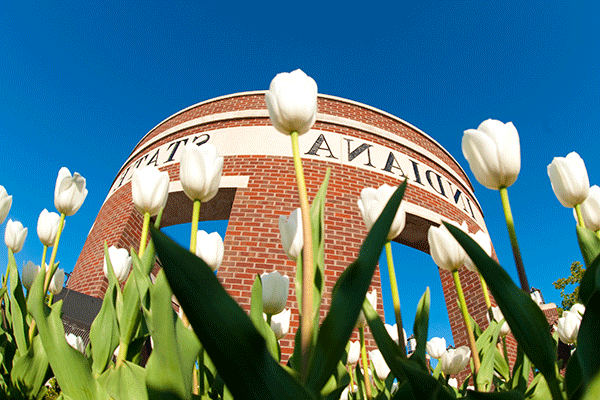Why Earn a Bachelor of Science in Engineering at Indiana State?
Engineering is a multidisciplinary field that applies scientific principles and mathematical methods to design, create, and improve structures, systems, and products, with a focus on solving practical problems and advancing technology. Today’s engineers know how to address real-world challenges in areas like infrastructure, healthcare, and energy, while enjoying diverse career opportunities and competitive salaries.
Tailor Your Degree to Meet Your Goals
Indiana State’s Engineering program offers you a solid foundation in engineering principles plus the opportunity for concentrated study based on your interests and career goals.
As an engineering major, you will complete our engineering core as well as mathematics and science coursework. You will tailor your degree by selecting a concentration in civil, industrial, or mechanical engineering.
Learn from Our Excellent Faculty
The Applied Engineering and Technology Management Department offers small class sizes, allowing for individual attention.
The Engineering BSE is a multidisciplinary program, which means you will benefit from courses taught by professors with a diversity of thought, expertise, and experience in the field. Most hold doctoral degrees. All are dedicated to your success.
Enrich Your Learning with Resources and Opportunities
Your coursework will be centered in the University's John T. Myers Technology Center, which has more than 20 state-of-the-art laboratories featuring the latest equipment and supplies.
In addition to your coursework, you may participate in activities and organizations that enable you to interact with other students and professionals in the industry. These include the American Society of Civil Engineers (ASCE); the American Society of Mechanical Engineers (ASME); the American Institute of Steel Construction (AISC); the Construction Specifications Institute (CSI); and Epsilon Pi Tau (the international honorary for professions in technology).
What You’ll Learn in the Engineering Program
The Engineering BSE Program provides the knowledge, experience, and technical problem-solving skills necessary for a successful career in engineering. Throughout the program, you will explore current engineering application and design considerations, with an emphasis on research, testing, design, and analysis.
The BSE coursework offers you a solid foundation in engineering principles plus the opportunity for concentrated study in one of the following areas: civil engineering, industrial engineering, or mechanical engineering.
Engineering Concentrations
The Civil Engineering concentration covers the aspects of structural analysis of concrete design, wastewater and drinking water system design, hydrology, and transportation engineering.
The Industrial Engineering concentration focuses on reliability, maintainability, operations, and production planning.
View the Industrial Engineering Concentration-Calculus Ready
The Mechanical Engineering concentration focuses on machinery dynamics, engineering design and management, heat transfer, and finite elemental analysis.
View the Mechanical Engineering Concentration-Calculus Ready

Transfer Credit
Indiana State University accepts credit from regionally accredited colleges and universities within the United States, and from selected schools located outside the United States. Credit also may be granted for military training and experience. Previously earned college credit can be applied toward completion of the program per Indiana State's transfer guidelines.
Transfer GuidelinesCareer Possibilities for Engineering Majors
Career paths for engineering graduates are diverse and will depend on the concentration completed. The overall job market for professional engineers is very strong, with many graduates finding employment at engineering firms, government offices, and manufacturing facilities.
Maximize Your Experience at Indiana State
Explore our Honors College to learn how you can maximize your college experience with faculty mentors, undergraduate research, internships, and Honors housing. Students in the Honors College also enjoy opportunities to travel across the nation and abroad for conferences, service-learning trips, and immersive academic and cultural studies.
Learn About the Honors CollegeAccreditation
Indiana State University is accredited by the Higher Learning Commission.
The Bachelor of Science in Engineering (BSE) is accredited by the Engineering Accreditation Commission (EAC) of ABET. http://www.abet.org
Program Educational Objectives (PEOs): Within a few years of graduation, graduates will:
PEO 1 - Apply their engineering education as active contributors in the workforce.
PEO 2 - Continue professional development through advanced studies, licenses, certifications, and/or professional society involvement.
PEO 3 - Demonstrate leadership in their profession and/or communities.
Student Outcomes (SOs):
(1) An ability to identify, formulate, and solve complex engineering problems by applying principles of engineering, science, and mathematics.
(2) An ability to apply engineering design to produce solutions that meet specified needs with consideration of public health, safety, and welfare, as well as global, cultural, social, environmental, and economic factors.
(3) An ability to communicate effectively with a range of audiences.
(4) An ability to recognize ethical and professional responsibilities in engineering situations and make informed judgments, which must consider the impact of engineering solutions in global, economic, environmental, and societal contexts.
(5) An ability to function effectively on a team whose members together provide leadership, create a collaborative and inclusive environment, establish goals, plan tasks, and meet objectives.
(6) An ability to develop and conduct appropriate experimentation, analyze and interpret data, and use engineering judgment to draw conclusions.
(7) An ability to acquire and apply new knowledge as needed, using appropriate learning strategies.
Related Programs
-

Civil Engineering Technology (BS)
Bachelor's
-

Engineering Technology Management (BS)
Bachelor's
-

Technology and Engineering Education (BS)
Bachelor's




